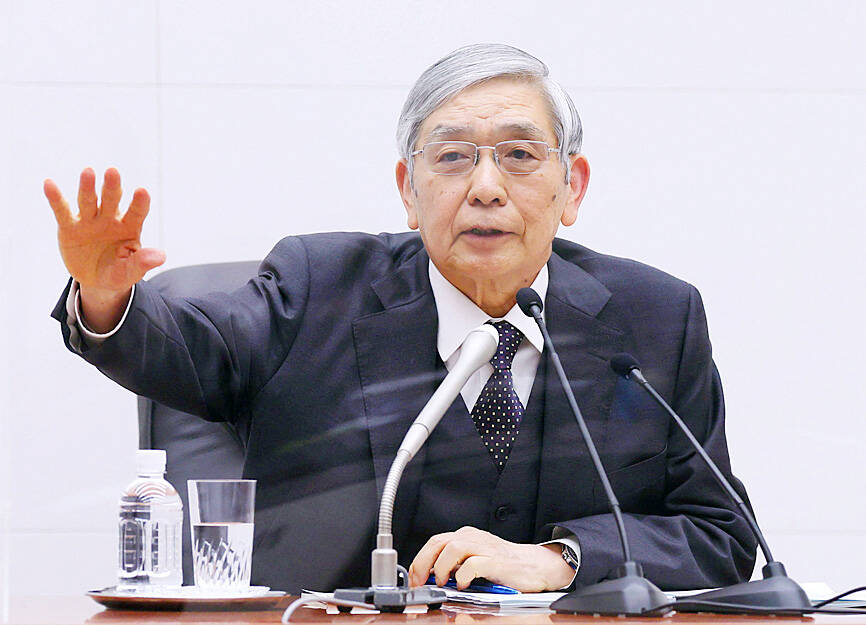The Bank of Japan (BOJ) announced an unprecedented third day of unscheduled bond purchases as it fights speculation that it is about to end its super-accommodative monetary policy.
The combination of additional fixed-rate and fixed-amount purchases announced yesterday have boosted this month’s buying to about ¥17 trillion (US$128.26 billion), a monthly record, according to data compiled by Bloomberg.
The BOJ’s avalanche of bond buying follows a surge in yields since the central bank unexpectedly raised its ceiling for the benchmark 10-year note to 0.5 percent at its Dec. 20 meeting.

Photo: Kyodo via Reuters
While policymakers said the move was to improve market functioning, traders have interpreted it as a step toward the end of the yield-curve control policy as they load up on short-interest stocks.
“Honestly, I don’t understand the BOJ’s intention,” Tokai Tokyo Securities Co chief bond strategist Kazuhiko Sano wrote in a research note. “The wider trading band is only fanning speculation of more policy changes and increased bond purchases risk reducing market liquidity even further.”
The BOJ yesterday offered to buy unlimited amounts of two-year bonds at a yield of 0.04 percent, and five-year debt at 0.24 percent, along with a total ¥700 billion of one-to-10 year bonds and ¥300 billion of 10-to-25 year debt.
That is in addition to daily operations to buy unlimited quantities of 10-year securities and futures-linked securities at 0.5 percent.
The BOJ said on Thursday it would provide banks with two-year loans at no interest next week.
Funds from BlueBay Asset Management to Schroders PLC have said they added to short positions on Japanese bonds, with some also buying the yen.
Meanwhile, economists have said that BOJ Governor Haruhiko Kuroda eroded his credibility by making the policy switch without warning.
Japan’s bond market is to reopen on Wednesday after the New Year holiday. The Ministry of Finance said it would auction ¥2.7 trillion of 10-year bonds on Thursday.
“It looks like the BOJ isn’t tolerating higher yields on shorter notes,” Mitsubishi UFJ Morgan Stanley Securities Co bond strategist Keisuke Tsuruta said in Tokyo. “These are probably preemptive measures because foreign funds come back after the New Year holiday and there will be a 10-year note auction.”
The 10-year bond extended gains after the BOJ’s additional debt purchases operation was announced, with its yield falling 4.5 basis points to 0.41 percent. The yen strengthened as much as 0.5 percent against the dollar, even though efforts to cap bond yields are generally negative for the currency.
The BOJ’s struggle to contain rising local yields could have a global consequence as those who have invested in Japan own US$2.4 trillion of foreign debt. Higher local yields could spur Japanese investors to bring home more funds, exacerbating upward pressures on bonds around the world.
“The ripples from the BOJ move continue to impact markets,” Commonwealth Bank of Australia currency strategist Martin Whetton wrote in a research note. “Hedge costs remain punitive. The yen could retrace, which leaves unhedged buyers out of pocket, and the domestic yields of course are attractive.”
The BOJ might surprise markets again by tightening monetary policy as soon as next month, former Japanese vice minister of finance and Aoyama Gakuin University professor Eisuke Sakakibara said last week.

Intel Corp chief executive officer Lip-Bu Tan (陳立武) is expected to meet with Taiwanese suppliers next month in conjunction with the opening of the Computex Taipei trade show, supply chain sources said on Monday. The visit, the first for Tan to Taiwan since assuming his new post last month, would be aimed at enhancing Intel’s ties with suppliers in Taiwan as he attempts to help turn around the struggling US chipmaker, the sources said. Tan is to hold a banquet to celebrate Intel’s 40-year presence in Taiwan before Computex opens on May 20 and invite dozens of Taiwanese suppliers to exchange views

Application-specific integrated circuit designer Faraday Technology Corp (智原) yesterday said that although revenue this quarter would decline 30 percent from last quarter, it retained its full-year forecast of revenue growth of 100 percent. The company attributed the quarterly drop to a slowdown in customers’ production of chips using Faraday’s advanced packaging technology. The company is still confident about its revenue growth this year, given its strong “design-win” — or the projects it won to help customers design their chips, Faraday president Steve Wang (王國雍) told an online earnings conference. “The design-win this year is better than we expected. We believe we will win

Chizuko Kimura has become the first female sushi chef in the world to win a Michelin star, fulfilling a promise she made to her dying husband to continue his legacy. The 54-year-old Japanese chef regained the Michelin star her late husband, Shunei Kimura, won three years ago for their Sushi Shunei restaurant in Paris. For Shunei Kimura, the star was a dream come true. However, the joy was short-lived. He died from cancer just three months later in June 2022. He was 65. The following year, the restaurant in the heart of Montmartre lost its star rating. Chizuko Kimura insisted that the new star is still down

While China’s leaders use their economic and political might to fight US President Donald Trump’s trade war “to the end,” its army of social media soldiers are embarking on a more humorous campaign online. Trump’s tariff blitz has seen Washington and Beijing impose eye-watering duties on imports from the other, fanning a standoff between the economic superpowers that has sparked global recession fears and sent markets into a tailspin. Trump says his policy is a response to years of being “ripped off” by other countries and aims to bring manufacturing to the US, forcing companies to employ US workers. However, China’s online warriors